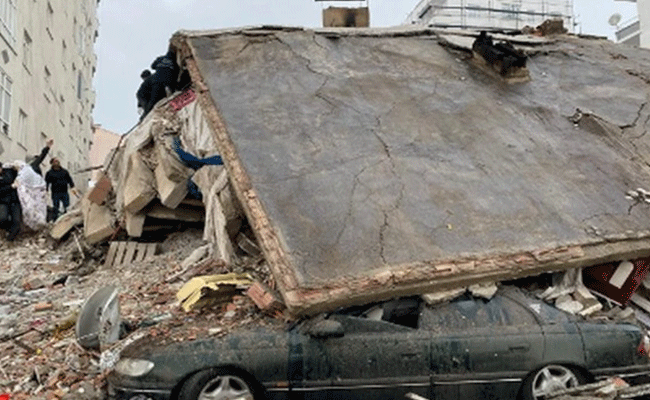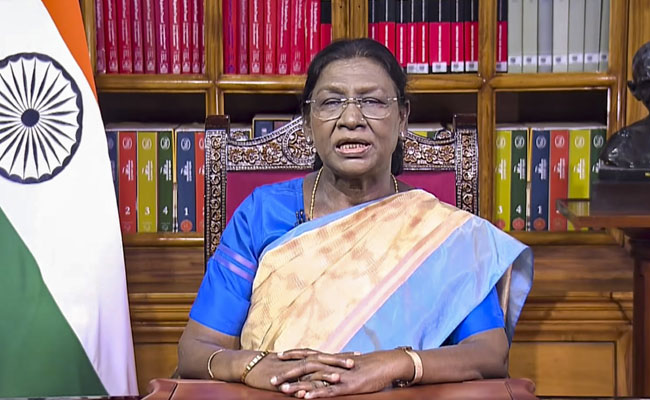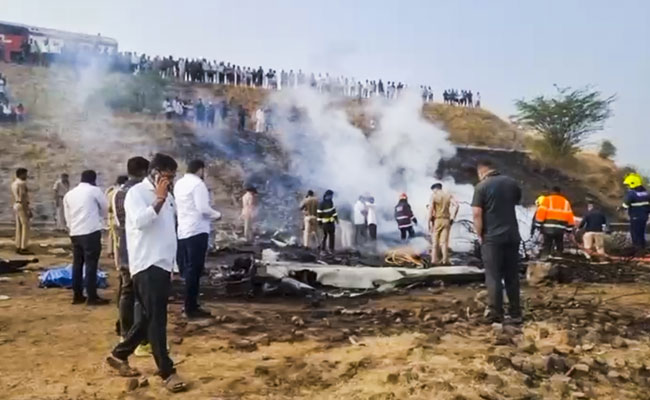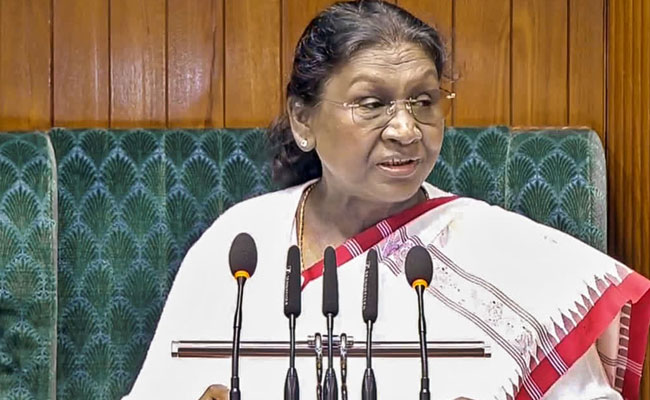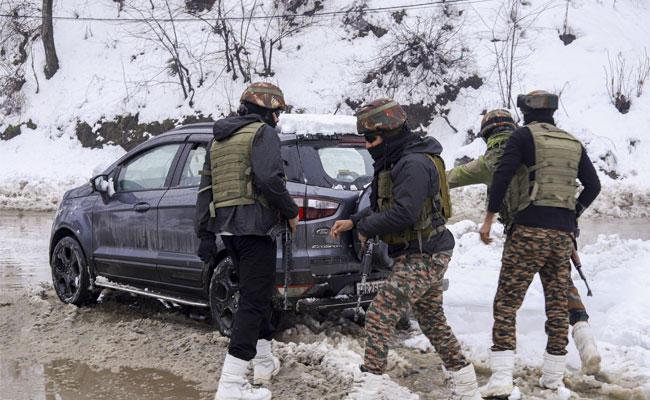Nicosia (Cyprus) (AP): A devastating earthquake that toppled buildings across parts of Turkiye and neighbouring Syria has revived a longstanding debate locally and in neighbouring Cyprus about a large nuclear power station being built on Turkiye's southern Mediterranean coastline.
The plant's site in Akkuyu, located some 210 miles (338 kilometres) and 245 miles (394 kilometres) to the west of the February 6 tremors' epicentres, is being designed to endure powerful tremors and did not sustain any damage or experience powerful ground shaking from the 7.8 magnitude earthquake and aftershocks.
But the size of the quake the deadliest in Turkiye's modern history sharpened existing concerns about the facility being built on the edge of a major fault line.
Rosatom, Russia's state-owned company in charge of the project, says the power station is designed to "withstand extreme external influences" from a magnitude 9 earthquake.
In nuclear power plant construction, plants are designed to survive shaking that is more extreme than what's been previously recorded in the area they're sited.
The possibility of a magnitude 9 earthquake occurring in the vicinity of the Akkuyu reactor "is approximately once every 10,000 years," Rosatom told The Associated Press via email last week. "That is exactly how the margin of safety concept is being implemented."
An official with Turkiye's Energy Ministry, when contacted by the AP, said there were no immediate plans to reassess the project. The official spoke on condition of anonymity in line with government protocol. Some activists, however, still say the project the first nuclear power plant in Turkiye poses a threat.
Nuclear facilities are constructed of heavily reinforced concrete, sized for significant earthquake shaking and far more robust than commercial buildings, said Andrew Whittaker, a professor of civil engineering at the University at Buffalo who is an expert in earthquake engineering and nuclear structures.
The fact that it's sited off the western end of the East Anatolian Fault, which was linked to last week's powerful tremor, suggests that the design would have been checked for significant shaking, Whittaker added.
Still, Whittaker said, it would be prudent to reassess seismic hazard calculations in the region for all infrastructure, including the plant.
"There's no reason to be concerned, but there's always a reason to be cautious," he said.
That's little comfort to activists in Turkiye and on both sides of ethnically divided Cyprus. They've renewed their calls for the project to be scrapped, saying that the devastating earthquake is clear proof of the great risk posed by a nuclear power plant near seismic fault lines.
In a statement to the AP, the Cyprus Anti-Nuclear platform, a coalition of over 50 Greek Cypriot and Turkish Cypriot environmentalist groups, trade unions and political parties, said it "calls on all political parties, scientific and environmental organisations and the civil society to join efforts and put pressure on the Turkish government to terminate its plans for the Akkuyu nuclear power plant."
Cypriot European Parliament member Demetris Papadakis asked the European Commission what immediate actions it intends to take to halt the plant because of the dangers posed by building a nuclear power station in a seismic zone so close to Cyprus.
Nuclear power plants worldwide are designed to withstand earthquakes and shut down safely in the event of major earth movement about 20 per cent of nuclear reactors are operating in areas of significant seismic activity, according to the World Nuclear Association.
For example, Japanese nuclear plants, including the Hamaoka Nuclear Power Plant, are in regions where earthquakes of up to magnitude 8.5 may be expected, the association said.
Stricter safety standards were adopted after the 2011 Fukushima nuclear disaster, when a tsunami crashed into the Daichi plant, melting three reactors and releasing dangerous levels of radiation. And the Diablo Canyon Power Plant in California was designed to safely withstand earthquakes, tsunamis and flooding that could potentially occur in the region too, according to its operator.
Turkish nuclear regulators provided the license for the plant's construction in Akkuyu in 1976 following eight years of seismic studies to determine the most suitable location, but the project was slowed down after the Chernobyl nuclear accident in 1986. Construction of the first reactor started in 2018. Large nuclear power plants have traditionally taken a while to build because of the size, scale and complexity of the infrastructure, and delays associated with first-of-a-kind plants.
According to Rosatom, a study by Turkiye's Office for the Prevention and Elimination of Consequences of Emergency Situations indicates that the site in Akkuyu some 60 miles (95 kilometres) from Cyprus' northern coastline is located in the fifth degree earthquake zone, which is considered the safest region in terms of earthquakes.
The plant design includes an external reinforced concrete wall and internal protective shell made of "prestressed concrete," with metal cables stretched inside the concrete shell to give additional solidity to the structure, the company said. And the modern reactor design, Russia's VVER-1200, includes an additional safety feature a 144 ton steel cone called the "core catcher" that in an emergency, traps and cools any molten radioactive materials, Rosatom added.
The company emphasised that power units with VVER-1200 reactors comply with the post-Fukushima requirements of the International Atomic Energy Agency.
There's a political dimension to qualms about the plant: Cyprus has accused Turkiye of augmenting the Turkish Cypriots' dependence on it in order to entrench the island's ethnic division. Turkiye has said it would supply the breakaway Turkish Cypriot north of the island with electricity through an undersea cable. A pipeline suspended a couple of hundred metres under the Mediterranean's surface is already supplying the north with water.
The plant, whose first of four reactors is scheduled to go online later this year, will have a total capacity of 4,800 megawatts of electricity, providing about 10 per cent of Turkiye's electricity needs.
According to government figures, if the power plant started operating today, it could singlehandedly provide enough electricity for a city of about 15 million people, such as Istanbul, Rosatom added.
It's estimated to cost USD 20 billion. Rosatom has a 99.2 per cent stake in the project, and is contracted to build, maintain, operate and decommission the plant.
Let the Truth be known. If you read VB and like VB, please be a VB Supporter and Help us deliver the Truth to one and all.
New Delhi (PTI): President Droupadi Murmu on Wednesday said the world saw the valour of Indian armed forces through Operation Sindoor when they destroyed terror camps on the strength of their own resources and asserted that any terror act will be responded with decisive action.
"India has proved that power can be used with responsibility and wisdom. The world has seen the valour and courage of Indian armed forces through Operation Sindoor," Murmu said in her address to both Houses of Parliament, marking the beginning of the Budget Session.
"Our nation, on the strength of our own resources, destroyed terror camps. My government sent a message that any act of terror will be responded to with resolute and decisive action," the President said, amid thumping of desks by Prime Minister Narendra Modi and other parliamentarians.
Murmu said the suspension of the Indus Water Treaty was part of India's fight against terror.
"We are also working on Mission Sudarshan Chakra to further strengthen national security," the President said, adding that security forces have also taken decisive action against Maoist terror.
Following Operation Sindoor, she said, the trust on Indian defence platforms has increased.
Murmu further said her government was committed to social justice in the country.
In the third term of the government, she said, work is being done to further empower the poor, and social security benefits are available to nearly 95 crore citizens now.
"My government is committed to true social justice," she said, adding that 25 crore Indians moved out of poverty in the last 10 years.
The President also said the government has been successful in tackling corruption and scams, and ensuring proper use of public funds.
"For India, the end of the first 25 years of this century has been filled with several successes, proud achievements and extraordinary experiences. In the last 10-11 years, India has strengthened its foundation in every sector," she said.
Lauding India's celebration of the 350th martyrdom day of the ninth Sikh guru, Guru Tegh Bahadur, and the country's tribute to revered tribal leader and freedom fighter Birsa Munda on his 150th birth anniversary, Murmu said, "when the country remembers the contribution of its ancestors, the new generation gets inspiration, which further speeds up our journey towards Viksit Bharat (Developed India)."
"The country celebrated the 350th Shaheedi Diwas of Sri Guru Tegh Bahadur Ji. During the 150th birth anniversary of Birsa Munda, the entire country paid him tribute and remembered his contribution to the tribal community," the President said.
"The events related to the 150th birth anniversary of Sardar Vallabhbhai Patel further strengthened the sense of Ek Bharat, Shresht Bharat (One India, Best India). The entire country became witness to how Bharat Ratna Bhupen Hazarika's birth anniversary celebrations filled the country with music and a sense of unity," Murmu said.
The President's mention of the Viksit Bharat – Guarantee for Rozgar and Ajeevika Mission (Gramin) (VB-G RAM G) scheme was met with loud protests from the Opposition benches.
Murmu said the VB-G RAM G initiative would provide guarantee for 125 days of work, would stop corruption and leakages, and provide a new impetus to rural development.
The Opposition members raised slogans demanding its rollback, even as the treasury benches thumped their desk in support of the scheme.
The President had to take a brief pause amid opposition cries of "vapas lo" (roll back) against the Act that replaced the Mahatma Gandhi National Rural Employment Guarantee Act (MGNREGA).
The Opposition parties have been demanding withdrawal of the VB-G RAM G Act and restoration of MGNREGA as a rights-based law in its original form, the right to work and the authority of panchayats.
The government has, meanwhile, claimed that the new Act will further strengthen the guarantee for rural employment.

